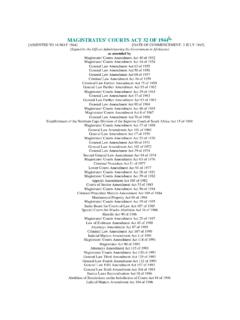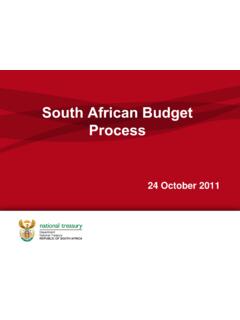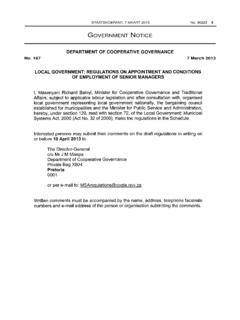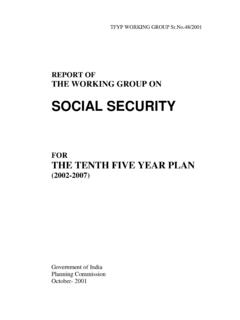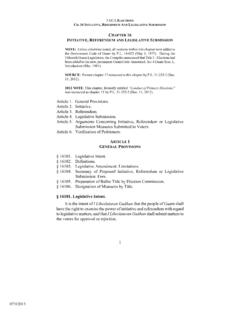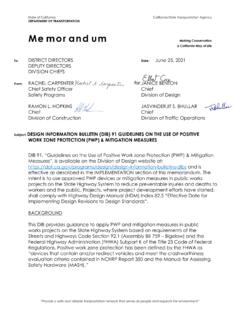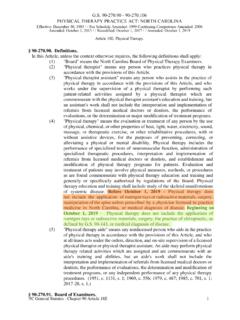Transcription of PRINCIPAL AS CURRICULUM MANAGER SESSION 1 …
1 CURRICULUM MANAGEMENT FOR EDUCATION MANAGERS WITH REFERENCE TO. SCHOOL PRINCIPALS. PRINCIPAL AS CURRICULUM MANAGER . SESSION 1 legislative requirements Management Professional requirements requirements PRINCIPAL CURRICULUM MANAGEMENT as CURRICULUM MANAGER Management International School Policy Standards National 1. Standards 2. INTRODUCTION INTRODUCTION. Principals are often challenged by the diverse roles which they have to play, as managers of a school. The Planning management of the CURRICULUM is in some instances delegated to Heads of Departments or Deputy Principals tasked with the academic programme of the school. Control Functions of a Organising measures MANAGER Directing (Leading).
2 3 4. INTRODUCTION INTRODUCTION. C2005 NCS CAPS The Minister of Basic Education received many complaints and comments regarding the implementation of the NCS: 1998 2002 2011. Outcomes Specify the Particular The overburdening of teachers with administrative tasks for learning knowledge sets of Different interpretations of the CURRICULUM requirements in broad component strategies to terms sequence The levels of learner underperformance in literacy and numeracy Teacher to and pace customise knowledge teaching and learning activities 5 6. 1. CURRICULUM MANAGEMENT FOR EDUCATION MANAGERS WITH REFERENCE TO. SCHOOL PRINCIPALS. INTRODUCTION INTRODUCTION. The appointment of a Ministerial Task Team and a CURRICULUM Reduce teachers' workload allow more time for teaching.
3 Review process recommended the following: Clarify Subject Advisors' roles nationally specify the exact nature of in-classroom and school support they should provide Rationalise the current NCS documents into a single set of simple to teachers. and coherent CURRICULUM documents Portfolios by all learners as separate compilations of assessment Conduct regular external annual assessment in Grades 3, 6 and 9 tasks will no longer be required. Introduce the teaching of English as a subject, from Grade 1 CTAs at Grade 9 have been discontinued with effect from 2010. Reduce the overload in the intermediate phase by reducing the CURRICULUM and Assessment Policy Statement (CAPS) documents number of subjects to six per subject per phase were developed in 2010.
4 Ensure that teacher training is strengthened The number of projects required for each learning area/subject Re-assert the role of textbooks and develop a national catalogue will be reduced to one project per year per learning of textbooks. area/subject Teachers are required to develop a single Teacher File for 7. planning purposes 8. INTRODUCTION PLANNING. DBE INITIATIVES TO SUPPORT CAPS IMPLEMENTATION. INFRA- Planning: STRUCTURE Ensure that the relevant subject policies are in place WORK Be knowledgeable on the relevant national and BOOKS provincial policies Be knowledgeable on the implementation of these ANA policies Ensure that a school policy referring to CURRICULUM related matters is developed CAPS.
5 9 10. PLANNING: legislative FRAMEWORK PLANNING: legislative FRAMEWORK. The planning function of the PRINCIPAL is governed by the South African Schools Act 84 of 1996 (Section 6 A). following frameworks: According to this act the Minister must determine: 1. legislative Framework (a) A national CURRICULUM statement indicating the minimum National Education Policy Act 27 of 1996 (Section 3 (4) (I) ): outcomes or standards; and NEPA identifies the 7 roles of educators which stipulates the CURRICULUM (b) A national process and procedures for the assessment of related activities which should be performed by teachers: learners achievement. Learning mediator Which provides the CURRICULUM framework in which public Interpreter and designer of learning programmes and materials schools are to function.
6 Leader, administrator and MANAGER Scholar, researcher and lifelong learner Community, citizenship and pastoral role Assessor Learning area / subject / discipline / phase specialist 11 12. 2. CURRICULUM MANAGEMENT FOR EDUCATION MANAGERS WITH REFERENCE TO. SCHOOL PRINCIPALS. PLANNING: NATIONAL CURRICULUM STATEMENT PLANNING: NATIONAL CURRICULUM STATEMENT. National CURRICULUM policies which should be referred to when The following supplementary policy documents should be referred planning school policy: to in compiling a school policy: Policy pertaining to the programme and promotion requirements 1. Education White Paper 1 on Education and Training of the National CURRICULUM Statement Grades R - 12.
7 2. Education White Paper 6 on Special Needs Education: Building an CAPS Subject policies Inclusive Education and Training System National Protocol for Assessment Grades R 12. National policy on the conduct, administration and management 3. Admission policy for ordinary public schools as published as Government Notice 2432, Government Gazette, Vol. 400, No 19377. of the National Senior Certificate: A qualification at Level 4 on the of 19 October 1998. National Qualifications Framework (NQF) 4. The Language-in-Education Policy 1997. 5. Norms on Roles and Responsibilities of Education Districts 13 14. PLANNING: NATIONAL CURRICULUM STATEMENT NATIONAL POLICY PERTAINING TO THE.
8 National Policy PROGRAMME AND PROMOTION REQUIREMENTS OF. Pertaining to Programme and THE NATIONAL CURRICULUM STATEMENT S R-12. Promotion Requirements The first policy which forms constitutes the National CURRICULUM Statement is the National Policy Pertaining to the Programme and Promotion Requirements of the NCS. This policy was promulgated in Government Gazette No. 36042 (28 December 2012) and it determines the minimum outcomes and standards, as well as the processes and procedures for the assessment of learner achievement. National Policy on the The following is covered by the policy: CURRICULUM and Conduct, Assessment Policy Approved subjects Administration and Statements (CAPS) for Management of the Programme requirements subjects NSC.
9 Grouping of subjects Time allocation Gr 10-12 Subject changes Assessment Concessions National Protocol of Assessment Progression / Promotion requirements 15. Recording and Reporting 16. NPPPR: PROGRAMME REQUIREMENTS NPPPR: PROGRAMME REQUIREMENTS. FET Phase Foundation Intermediate Senior Phase Language at Home Language Level Phase Phase Language at First Additional Language Home Language Home Language Home Language Mathematics / Mathematical Literacy / Technical Mathematics (Vocational ONLY). First Additional Language First Additional Language First Additional Language ACADEMIC VOCATIONAL. Mathematics Mathematics Mathematics Not Designated Subjects Designated Subjects Technical Science / Physical Life Skills Natural Sciences and Natural Sciences Agricultural Management Accounting, Science Beginning Knowledge Technology Practices; Agricultural Sciences, Civil Technology (Spec).
10 Mechanical Technology Creative Arts Social Sciences Social Sciences Agricultural Technology Business Studies, (Spec). Physical Education Life Skills Technology Dance Studies; Dramatic Arts, Electrical Technology (Spec). Personal and Social Design; Economics, Economic and Management Life Orientation Engineering Graphics and Design, Engineering Graphics and Well-being Creative Arts Sciences Design Computer Applications Geography, Physical Education Life Orientation Technology; History, Personal and Social Well- Arts and Culture Hospitality Studies; Consumer Studies, being Tourism. Information Technology, Life Sciences, Music, Physical Sciences, 17 Religion studies, Visual Arts 18.





